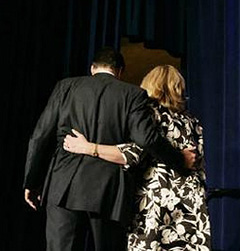
|
 |
 |
 Editorials | Opinions | February 2008 Editorials | Opinions | February 2008  
Mitt’s Funeral
 Timothy Egan - NYTimes Timothy Egan - NYTimes
go to original


| | US presidential candidate and former Governor Mitt Romney (R-MA) (L) and his wife Ann walk away after he dropped out of the presidential race at the American Conservative Union's 2008 Conservative Political Action Conference at the Omni Shoreham Hotel in Washington February 7, 2008. (Reuters/Larry Downing) | | |
Mitt Romney is gone, having suspended his campaign in the face of delegate math that cannot work in his favor, no matter how he crunches the numbers. But before he leaves the stage, the record should show who – or what – did him in.

Blame Christians. By significant margins, in poll after poll, in vote after vote a solid block of evangelical Christians said they would never vote for a Mormon. Since evangelicals made up nearly half of the Republican primary vote in some states, Romney was up against a deep well of distrust of a religion that many evangelicals still label a cult.

It showed again Tuesday, in exit polls in the bellwether state of Missouri. Among the small group of Republican voters who say they never go to church, Romney got his highest vote total – 39 percent. Among people who attend services more than once a week, he received his lowest, 21 percent.

Put another way, those dreaded secularists – whom Romney himself criticized in his off-tune and hugely miscalculated speech on religion in December – were far more likely to vote for him than were the most devout Christians.

“Most evangelicals will still be suspicious of Mormonism as a religion,” noted Christianity Today, a leading evangelical periodical, after the speech, which was Romney’s attempt to defuse the issue. “The religion’s continued rejection of historic Christian truths feeds that suspicion.”

Of course, there are many other reasons why the well-funded ex-governor with the to-die-for resume never got any traction. Many voters found him unctuous, weasely, fake. He didn’t wear well. His voice was grating and snappish. He was too perfect, on the surface, for the human race, let alone America on the cusp of a recession and an uncertain war. He changed positions so dramatically on gays and abortion that Senator John McCain could call him the true “change” candidate in a debate, and the audience laughed at the obvious joke.

But as it became clear that McCain, who is anathema to many conservatives, was going to head the Republican ticket, Romney had his chance. Gov. Mike Huckabee, for all his chuckleheaded bon mots, was never a viable candidate. He simply didn’t have the money, the experience or the judgment. Talk radio’s leading gasbag, Rush Limbaugh, said as much, telling listeners that a vote for Huckabee was a vote for McCain.

Yet, precisely at Romney’s opening, the Christian base was not there to help him. On Super Tuesday, the influential evangelist James Dobson said he would sit out the election if John McCain was the nominee. At the moment Romney most needed him, Dobson threw no life jacket his way.

And those who think that race without Huckabee would have given Romney the conservatives he needed are delusional.

It’s tempting to call these voters anti-Mormon bigots. Polls show evangelicals are three times as likely to vote for a black candidate as a Mormon. In the late 1960s, the percentage of Americans who said they would not vote for a Jew was in the teens. By 2000, that number was down to the low single digits. A similar tolerance opened up for Catholics.

But on Mormons, the numbers never moved. About 17 percent of Americans say they have qualms about voting for a Mormon – the same number as in 1967.

Among evangelicals, it’s far worse. Southern Baptists, a huge part of the Republican base, have labeled Mormonism a cult. Mormons believe that the Garden of Eden was in Missouri, and that a lost tribe of Israelites found their way to North America – both anthropological fairy tales, and heresies to many evangelicals.

According to a Pew Center poll, 36 percent of evangelicals said they would be less likely to vote for a candidate who was Mormon. This is 50 percent higher than the nation as whole.

Romney has to know this. If he had been honest on this issue, addressing it head on, perhaps his fate would have been different.

In his speech on Mormonism in December, he took a swipe at secular Americans, missing his chance to dislodge the real base of anti-Mormon prejudice. And in his remarks Thursday in which he announced the suspension of his campaign, he mentioned the Democrats and “opponents of American culture” in the same sentence.

He would have been better off had he begged for tolerance from an audience full of the people who did him in.

Timothy Egan worked for 18 years as a writer for The New York Times, first as the Pacific Northwest correspondent, then as a national enterprise reporter. In 2006, Mr. Egan won the National Book Award for his history of people who lived through the Dust Bowl, The Worst Hard Time. In 2001, he won the Pulitzer Prize as part of a team of reporters who wrote the series How Race Is Lived in America. Mr. Egan is the author of five books, including "The Good Rain: Across Time and Terrain in the Pacific Northwest," and "Lasso the Wind, Away to the New West." He lives in Seattle. | 
 | |
 |



